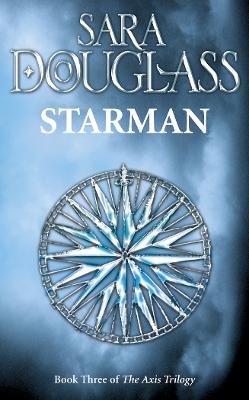
pamela
Whether Douglass ran out of ideas or just didn’t know how to tie her story together, I don’t know, but everything that made the first two books great was gone in Starman. Douglass relies heavily on cliché and melodrama, introduces satellite characters that do nothing to enhance the plot, and undoes so much of the excellent work she did in the first two novels of building the strong characters that she did.
It was a sadly anticlimactic end to what had been a sometimes grand but often tragic campaign.
Faraday spends most the book pregnant, and instead of fighting for her independence and freedom, leading the Avar into the new Tencendor, she has no purpose but to be pretty, insipid, and the perpetual victim. It’s her son who will eventually do the job that should have been hers. She stops developing entirely, plants a few trees, and then walks straight into her fate without even bothering to fight for her survival. Even the one battle that could have been hers to showcase one more moment of strength and defiance had to be fought by Azhure on her behalf. She was nothing but a damsel in distress this whole novel, which seemed such a disservice to the tragic strength of her character from the previous instalments.
Azhure, the strong, badass warrior from the first two books was gone. She spent the entirety of Starman nursing babies, being a generally shitty parent, and using her boobs to win battles. In Enchanter Azhure started growing into her character. She was a strong huntress who excelled in battle and was a capable commander in Axis’ army. In Starman, however, she’s pregnant, again, (in fact, almost every single female protagonist spends part of this novel pregnant) for a good chunk of the novel, and instead of doing any actual fighting, she makes people and creatures lust after her instead. I wish I were kidding. It was such a disservice to her character. I wanted her to be fierce. I wanted her to be strong. But instead, she becomes nothing but an object of lust, falling into the pitfalls of the fantasy genre. Men are good at things. Women either need saving or have boobs.
As for Axis himself, he has always been a bit of a dick, but he didn’t get any development in Starman, so he was frankly unlikeable. He’s a terrible father, a terrible friend, barely does anything to earn him the glory and power that he has. He just turns up at appropriate times while others do the work for him. Everyone else sacrifices while he revels in the glory, and I found it quite hard to stomach.
The end of Enchanter had introduced the Acharite god, Artor, as a character, and I remembered that plotline as being quite dramatic. Re-reading Starman as an adult, however, I realised that it was a worthless plot addition that went nowhere. His entire role is merely to act as another reason for Faraday to be a victim, and to prove a foil for the Star Gods to whom we are introduced in this book. Even they served no purpose other than to arrive at convenient times, confuse mere mortals with cryptic language, and make unwanted sexual advances to just about everyone. They accept worship but do absolutely nothing of discernible use at any point.
One of my most significant issues, however, is that all the hanging plot threads are told in exposition, not discovered organically. For the first two books, Douglass’ character development and world building were wonderful. The plot and characters did fall into cliché’d archetypes, but everything was still unique and developed enough that it was easy to forgive it. In Starman however, anything the characters needed to know was conveniently explained to them at times they needed it. Azhure didn’t find out about her mother organically, she was told about her. We didn’t find out about the Star Gods piecemeal, it was explained. WolfStar was potentially one of the most exciting characters in the series, and even he, at the very end, almost as an afterthought, appears and explains how he came to be who he was – and quite frankly anyone who was paying attention would have worked that out already. No characters take responsibility for their actions. A lot of them rely on simply falling on “the prophecy made me do it.”
Azhure spends a bulk of the novel with the twins, either pregnant or being an awful mother. There was an interesting plot point that could have been developed as she and Axis tried to deal with the mental trauma that the two babies had experienced in the womb in the previous novel. This could have been so deep and affecting. It would have humanised Axis and Azhure who spend the whole of Starman being larger than life, but instead, it just turns out that the babies were evil. Babies aren’t just evil! They become that way through shitty parenting. This results in far too many suggestions of infanticide from multiple characters to be comfortable.
All the women in Starman end up being interesting only for their sexuality, with too much focus put on the fact that their children carry traits passed down through ‘blood’. This is troubling on so many levels. It was certainly a part of the previous novels, but on this read-through, it jarred. Gorgrael only hates because he’s Avar. It’s essentially the message with which the novel leaves us. That is pretty damn horrific, and also entirely not how human emotion works.
I have always loved this trilogy. They’re the books that got me into the fantasy genre so long ago. I still absolutely loved reading both Battleaxe and Enchanter, but Starman just left me feeling cold. It was a poor end to an otherwise thoroughly enjoyable trilogy. The world and characters that Douglass built deserved more.
